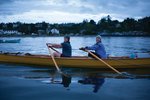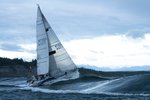To say this year’s Race to Alaska has been an odyssey of its own is an understatement.
From capsized vessels to driftwood obstacles to new records and routes to the finish point in …
This item is available in full to subscribers.
We have recently launched a new and improved website. To continue reading, you will need to either log into your subscriber account, or purchase a new subscription.
If you had an active account on our previous website, then you have an account here. Simply reset your password to regain access to your account.
If you did not have an account on our previous website, but are a current print subscriber, click here to set up your website account.
Otherwise, click here to view your options for subscribing.
* Having trouble? Call our circulation department at 360-385-2900, or email our support.
Please log in to continue |
|


To say this year’s Race to Alaska has been an odyssey of its own is an understatement.
From capsized vessels to driftwood obstacles to new records and routes to the finish point in Ketchikan, Alaska, 2022’s race has been anything but uneventful.
Following Team Pure & Wild’s breakaway victory to win first place and the $10,000 top prize, two nautical squads raced neck-and-neck, vying for second place.
Team Elsewhere and Team Fashionably Late battled it out for the silver medal and a coveted set of steak knives, with Team Elsewhere eventually pulling ahead to finish in second on June 22.
Many of the participating monohull sailboats and catamarans have finished the race or are nearing the end of the long journey. The true, gritty clash during the later days of Race to Alaska involve the human-powered vessels. Lacking the ability to harness the raw power of the ocean winds, competitors in rowboats and similar watercrafts find themselves in a trial of endurance and mental fortitude.
For Race Marshal Jesse Wiegel, it’s been fascinating to watch the race unfold and to observe the willpower and mental focus of the racers.
“It’s been a tough race for a lot of people,” Wiegel said.
“Race to Alaska has come back with a vengeance; there’s been a lot of obstacles for people.”
From the starting point in Port Townsend to now, the teams have encountered one obstacle after another, from extremely high tides to passages filled with driftwood logs.
A major aspect of this year’s race was the massive section of the route in British Columbia being engulfed in miles of driftwood — a remnant by a massive mudslide a year or two ago.
“I think a defining element of this year will always be remembered by the logs,” said Race Boss Daniel Evans. “It was like the perfect storm of logs drifting around in the water.”
In the final half of Race to Alaska, many of the biggest challenges for teams don’t necessarily come from Mother Nature, but from the mind.
“This year, most of the teams have dropped out because of boat failure and capsizes, and now we’re entering that state where a lot of what causes them [to drop out] is the mental state,” Evans said.
After days of being battered by what Evans described as “anvil-headed” waves, navigational challenges, fatigue, and other major obstacles, the fortitude of participants will be tested until the finish.
Race to Alaska finds the unique weaknesses of each team and exploits it, Evans said.
“The other teams; the hardest thing right now is the mind, they’ve gone through some very awful weather,” he said.
A captivating part of watching Race to Alaska unfold for Wiegel has been observing the courage and perseverance of participants, and the unique solutions they’ve found through the adversity.
One racer, Robert McCall of Team Zen Dog out of the United Kingdom, dealt with debilitating blisters in the event.
After the wounds became infected, McCall even completely changed his rowing style to avoid using the same sections of his hands, but eventually had to drop out from shear pain, Wiegel said.
Wiegel noted a competing squad from France that used an avant-garde solution to the chilly Alaskan climate that intrigued the race marshal.
“They actually made themselves underclothing out of plastic bags to keep moisture off them,” he said. “The cold is a surprising element.”
As of Tuesday morning, 10 teams remained in the Race to Alaska, with all having passed through Vancouver Island.
While many teams are separated by vast distances, two all-female rowing squads, Team Don’t Tell Mom and Team Let’s Row Maybe, are in a dogfight along Fraser Reach in British Columbia.
It’s wonderful to see the stories of triumph continue and to hear of the racers receiving help along their taxing journeys, Wiegel said.
“The capacity of human [willpower] to endure and triumph over this is pretty crazy,” he said.